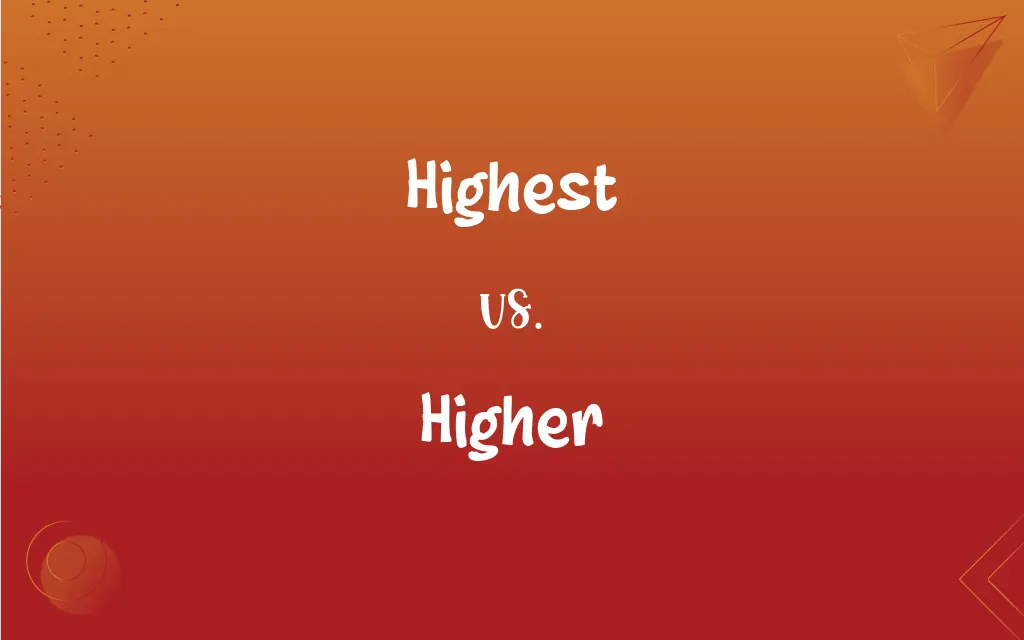Highest vs. Higher: What's the Difference?
Edited by Aimie Carlson || By Harlon Moss || Updated on November 6, 2023
"Highest" refers to the topmost level or degree, while "higher" indicates a level or degree that is above another but not necessarily the topmost.

Key Differences
The word "highest" is the superlative form of "high," indicating the utmost degree or the most extreme point in a set or range. "Higher," on the other hand, is the comparative form of "high," and it denotes a greater degree than something else but does not imply being the utmost.
"Highest" is used when comparing three or more items, persons, or concepts to signify the one at the top. "Higher," however, is used to compare two things, where one is superior to the other in degree, position, quality, or status but doesn't imply it is the ultimate.
When someone climbs a mountain and reaches the peak, they have reached the "highest" point, implying no point is above it. In contrast, if they are midway up the mountain, they may still climb "higher" without being at the highest point.
The "highest" score in a game is the score that no other player has surpassed. A "higher" score means a score that exceeds another player's score, but it may not be the highest overall.
"Highest" is an absolute term that doesn't require a reference to another item for its meaning—it stands alone at the top. "Higher" depends on the context and must be understood in relation to another item that is not as high.
ADVERTISEMENT
Comparison Chart
Degree
Superlative form (topmost level)
Comparative form (greater than another)
Comparison
Among three or more items
Between two items
Context
Does not need a point of reference
Requires another item for comparison
Frequency
Used less frequently; specific instances
Used more frequently; general comparisons
Extremity
Denotes an extreme or absolute level
Indicates a relative level of degree
ADVERTISEMENT
Highest and Higher Definitions
Highest
Situated above all others.
The highest mountain in the world is Mount Everest.
Higher
Greater in degree or quantity.
The costs are higher this year due to inflation.
Highest
Of the greatest degree.
She achieved the highest score possible on the exam.
Higher
More elevated than something else.
The shelf on the right is higher than the one on the left.
Highest
Ranking above all others.
The CEO holds the highest position in the company.
Higher
Increased in rate or value.
Interest rates are higher than they were last year.
Highest
At the maximum level.
The volume was turned to the highest setting.
Higher
More advanced in rank or position.
She was promoted to a higher role within the company.
Highest
Of the utmost importance.
Freedom is of the highest value in our society.
Higher
Elevated in quality or excellence.
The higher quality of the fabric is noticeable.
Highest
Having a relatively great elevation; extending far upward
A high mountain.
A high tower.
Higher
Having a relatively great elevation; extending far upward
A high mountain.
A high tower.
Highest
Extending a specified distance upward
A cabinet ten feet high.
Higher
Extending a specified distance upward
A cabinet ten feet high.
FAQs
Can "higher" imply the highest possible level?
No, "higher" indicates a level above another, not necessarily the topmost level.
Is "highest" a relative term?
No, "highest" is an absolute term indicating the extreme in a series or range.
Is "highest" always used in a physical context?
No, "highest" can refer to physical, quantitative, or hierarchical contexts.
How do I use "highest" correctly in a sentence?
Use "highest" when you are referring to the item that is at the top level among others.
Are "higher" and "highest" interchangeable?
No, they serve different grammatical purposes and are not interchangeable.
Can "higher" be used when comparing more than two items?
Yes, but it only compares one item to another at a time, not to the entire set.
Does "higher" always refer to vertical height?
No, "higher" can also refer to rank, intensity, volume, quality, etc.
Can "higher" refer to quality?
Yes, "higher" can refer to a greater degree of quality compared to something else.
Can "highest" be subjective?
Yes, in matters of opinion, such as "highest priority," it can be subjective.
Can "highest" be used in rankings?
Yes, "highest" is often used to describe the top rank in a list.
Is "highest" used in academic grading?
Yes, it can refer to the highest grade or score achieved.
Can "highest" be used to describe intensity?
Yes, like in "the highest degree of difficulty."
Can "higher" relate to sound pitch?
Yes, a note can be higher in pitch than another.
Is "highest" an absolute superlative?
Yes, it signifies the utmost extent in its category.
Can "highest" be used without a point of comparison?
Yes, because it designates the topmost point without needing comparison.
Does "higher" suggest improvement?
Yes, "higher" can suggest an improvement or an increase from a previous state.
Is "higher" used to describe academic levels?
Yes, such as "higher education" meaning post-secondary education levels.
Is "highest" used in expressions?
Yes, in expressions like "highest regard" or "highest compliment."
Can "higher" be used figuratively?
Yes, "higher" can be used in a figurative sense, such as "higher purpose."
Does "higher" relate to economic terms?
Yes, like in "higher prices" or "higher wages."
About Author
Written by
Harlon MossHarlon is a seasoned quality moderator and accomplished content writer for Difference Wiki. An alumnus of the prestigious University of California, he earned his degree in Computer Science. Leveraging his academic background, Harlon brings a meticulous and informed perspective to his work, ensuring content accuracy and excellence.
Edited by
Aimie CarlsonAimie Carlson, holding a master's degree in English literature, is a fervent English language enthusiast. She lends her writing talents to Difference Wiki, a prominent website that specializes in comparisons, offering readers insightful analyses that both captivate and inform.































































